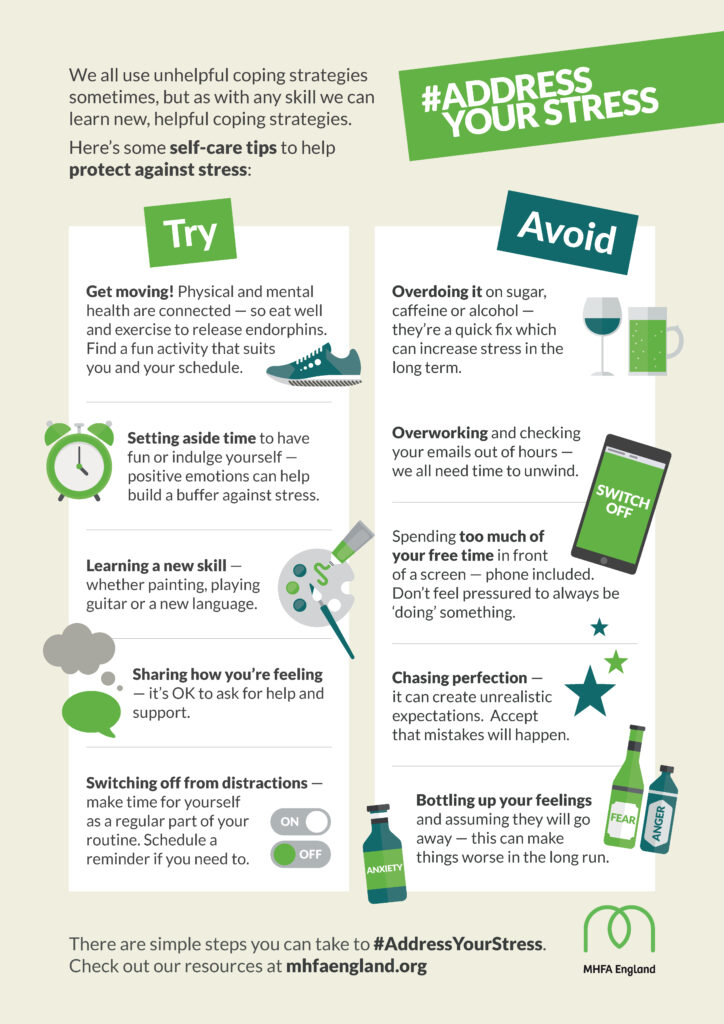Pros & Cons of Work for Mental Health
Dr A.J. Yates is the founder and lead trainer for AJMH Limited. In this guest blog he explains the effect that stress can have on us and provides advice on how you can deal with it.
Stress is a common condition and is often spoken about in the workplace, but what do we mean when we talk about work-related stress? Exactly how big is the problem and what can be done about it? And is work, by its very nature, inherently bad for us?
Work-related stress is defined as a harmful reaction that people have owing to undue pressures and demands in the workplace, and is something that we will have all experienced to a certain extent at one point or another.
That’s not to say that stress itself is inherently bad – there is an evolutionary advantage to having a boost of adrenaline when a sabre-toothed tiger jumps out on you (leading to a fight/flight/freeze response), and some professions use this to increase their performance (such as athletes, for example).
But the key point here is that stress hormones are designed to be used short-term and for specific instances – we’re not designed to be under stressful situations for prolonged periods of time, and to do so inevitably leads to problems. Ongoing anxiety can affect someone emotionally and physically, leading to symptoms such as constantly feeling on edge, being irritable, having trouble concentrating, fatigue, headaches, gastric problems, and (in the acute form) panic attacks.
From an individual point of view, the impact of these symptoms can be profound and not only lead to issues with motivation and performance at work, but can also spill over to affect personal life and relationships.
Whilst the effects of work-related stress on the individual can be striking, it’s difficult to quantify the impact that it has. However, the statistics around stress in the workplace give a clearer picture of the scale of the problem:
- In 2018/19, there were 602,000 cases of work-related stress, depression or anxiety in Great Britain
- These 602,000 cases were responsible for 44% of all cases of work-related ill health
- They also accounted for 12.8 million working days lost. That equates to 54% of all working days lost due to health issues
Clearly the scale of work-related stress needs addressing, especially as the situation is only going to get worse with the current COVID-19 restrictions. And yet – despite the size of the problem – 69% of UK line managers report that whilst they think supporting employee well-being is a core skill, only 13% have received mental health training.
The predominant cause of work-related stress is reported to be workload – particularly tight deadlines, too much work, or too much pressure/responsibility. It’s a common story – especially during tough economic times.
One university I studied at had to make monetary savings – during the four years that I was there, the department I was attached to lost half of its staff. But the number of students stayed the same – the increased workload was just shared out amongst those that were left. Needless to say, it was quite a pressurised environment to work in.
So, what is to be done? If the pressure of work is constant, and the workload won’t diminish, what can we do as individuals to help us cope with the pressure, and is there anything that employers can do help mitigate the problem?
The most important thing is not to ignore the problem. We all have a “stress container”, where our stresses get dumped (not just from work – relationship issues, money worries, health concerns – they all get dumped into one big receptacle). Whilst it might be tempting to try and ignore what’s worrying us, eventually the container will overflow – not only will you not be able to cope with any more stress, you won’t be able to cope full-stop.
Opening a release valve on this container doesn’t stop the stresses flowing in, but does help to make you more resilient and so better able to cope with them. And opening the release valve on the stress container is as simple as doing things that bring you joy, help calm an over-anxious mind, and bring you some relief from the pressures that you’re under.
(Image courtesy of Mental Health First Aid England.)
 Mental Health First Aid England have a number of free resources that you can download which help show how to deal with stress. They include advice on what to do (and not to do) in order to cope better – the illustration here has some great examples. They have similar resources to consider what stress is, common sources of stress, and a “weekly well-being check-up” which is a great way of taking time to address your stress.
Mental Health First Aid England have a number of free resources that you can download which help show how to deal with stress. They include advice on what to do (and not to do) in order to cope better – the illustration here has some great examples. They have similar resources to consider what stress is, common sources of stress, and a “weekly well-being check-up” which is a great way of taking time to address your stress.
Mental Health First Aid England’s website also has resources specifically designed for workplaces, including a free to download Line Managers’ Resource, which is a brilliant start for anyone in a managerial role who wants to know more about mental health in the workplace, but is not sure where to start (the four-hour Mental Health Awareness course is also a really good starting point).
For employers, the other advantage to having these free resources available is that by utilising them they can normalise stress in the workplace, acknowledge that there will be times when stress can become overwhelming, and let everyone know that “it’s OK not to be OK”.
The impact of conditions such as Generalised Anxiety Disorder and panic attacks can be profound, but there are a number of interventions (from medication through to talking therapies and social prescribing) that can help. The key thing is, the sooner someone seeks help, the sooner they receive that help, the quicker they recover. Reducing the stigma that continues to surround mental health, and encouraging people to be more open about their stresses (and mental health in general) will encourage them to ask for help when it’s needed – not when it’s too late.
But why do we go to work at all, when we know how damaging it can be to our health?
We often focus on the negative side of work, and the stresses that can be associated with it, but the reality is that work can be incredibly beneficial for well-being. Being employed can give financial security, provide us with a sense of purpose, structure to our lives, and allow access to a social network outside of usual friends & family.
For many people, voluntary work has the same benefits (minus the financial security). Some of these have become more of an issue during the current pandemic as more of us are working from home, but even a group meeting via Zoom can give a sense of belonging.
Interestingly, research in 2019 suggested that you don’t need to work full-time to get all of the benefits from being employed. In fact, the researchers found that the optimum time needed to maximise your well-being through work was just one day a week. Whilst that’s not a recommendation for us all to go part-time en masse, it does have implications for workplaces moving forward.
Whilst there’s no one-size-fits-all, as more businesses come out of the pandemic questioning whether they need to rent office space any more, it’s worth considering that a team get together once a week will help reinforce the social network and keep that sense of structure, whilst still allowing the flexibility of home working.
Ultimately, however you do it, be aware of the stresses that we’re all under to one degree or another, don’t forget the profound impact that stress can have on your well-being & ability to function, and take time each week to have a well-being check-up and address that stress to help prevent it from becoming a problem.
 Dr A.J. Yates is the founder and lead trainer for AJMH Limited. He brings experience from a range of healthcare backgrounds. He also is supported by thousands of hours of practice providing first aid (and Mental Health First Aid) care to a wide variety of people of all ages. His practical experience, coupled with his extensive doctoral research at the University of Westminster (investigating women’s experience of distress) makes him an authority on the impact of everyday distress (as well as diagnosable mental illnesses) on the well-being of those affected.
Dr A.J. Yates is the founder and lead trainer for AJMH Limited. He brings experience from a range of healthcare backgrounds. He also is supported by thousands of hours of practice providing first aid (and Mental Health First Aid) care to a wide variety of people of all ages. His practical experience, coupled with his extensive doctoral research at the University of Westminster (investigating women’s experience of distress) makes him an authority on the impact of everyday distress (as well as diagnosable mental illnesses) on the well-being of those affected.







Reading your article helped me a lot and I agree with you. But I still have some doubts, can you clarify for me? I’ll keep an eye out for your answers.
Can you be more specific about the content of your article? After reading it, I still have some doubts. Hope you can help me. https://www.binance.com/lv/register?ref=53551167